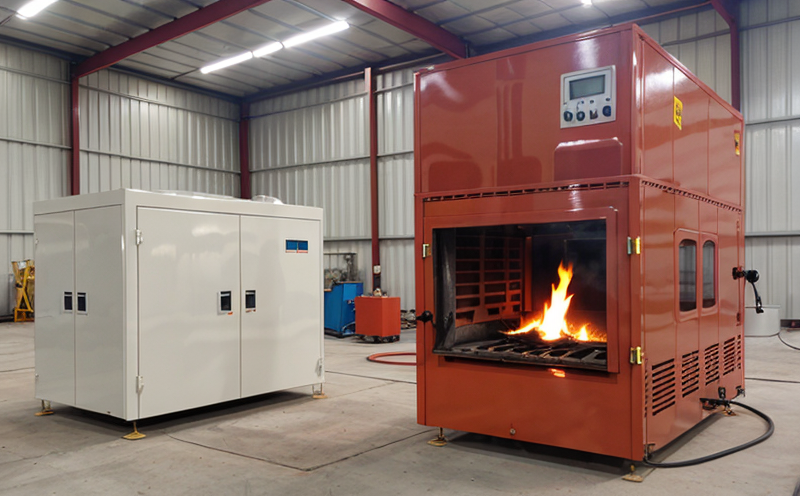ASTM D3418 Glass Transition Temperature by DSC
The ASTM D3418 standard method is a widely accepted technique used to measure the glass transition temperature (Tg) of thermoplastic materials. This critical property indicates when a polymer transitions from a solid, brittle state to a more flexible, rubbery one under heating conditions. Understanding Tg is essential for quality assurance in manufacturing processes, ensuring that materials meet performance and safety standards.
The technique involves subjecting the sample to controlled temperature ramping while simultaneously monitoring heat flow using differential scanning calorimetry (DSC). The point at which there is a significant change in heat flow corresponds to the Tg. This method not only provides valuable insights into material behavior but also ensures that products comply with international standards like ASTM D3418.
For accurate results, careful sample preparation and handling are crucial. Samples must be dried to remove moisture content as water can significantly affect the measurement of glass transition temperatures. The choice of heating rate is critical; it influences both the precision and accuracy of Tg determination. Typically, a heating rate between 10°C/min and 20°C/min is recommended for most polymers.
The DSC apparatus used must meet stringent calibration standards to ensure reliable data. Calibration can be performed using reference materials whose properties are well-documented in the literature. In addition to Tg, this method also measures crystalline melting points, which further aids in understanding the thermal behavior of a material.
In real-world applications, ASTM D3418 is frequently used in industries such as automotive, electronics, and aerospace where materials need to withstand various environmental conditions without losing their structural integrity. For instance, in the automotive sector, ensuring that plastic components can handle extreme temperatures ensures safety and durability of vehicles under diverse weather conditions.
The importance of Tg cannot be overstated; it influences everything from product design to end-user experience. Products with an accurate understanding of their Tg values are more likely to perform consistently across different environments. This information is vital for industries where precision and reliability are paramount, such as in the development of new medical devices or electronic components.
- Customer Impact and Satisfaction: By providing precise measurements that align with industry standards like ASTM D3418, customers benefit from enhanced product quality and performance. This leads to higher customer satisfaction and a stronger market presence for compliant products.
Achieving compliance through this method ensures that manufacturers can confidently meet regulatory requirements set by bodies such as the International Organization for Standardization (ISO).
The ASTM D3418 glass transition temperature test is a cornerstone in ensuring product reliability and safety. It helps identify potential issues early in the development cycle, allowing for necessary adjustments to be made before full-scale production.
Eurolab Advantages
At Eurolab, we pride ourselves on offering comprehensive metallurgical and material testing services that go beyond compliance. Our expertise lies in delivering accurate, reliable results using state-of-the-art equipment and highly skilled professionals.
- Accurate Results: Leveraging the latest DSC technology ensures precise measurements of glass transition temperatures, providing customers with confidence in their test results.
- Comprehensive Support: Our team offers expert guidance throughout the testing process, from sample preparation to result interpretation. This personalized service sets us apart and ensures that our clients receive more than just a report; they get actionable insights tailored to their specific needs.
- Regulatory Compliance: With years of experience in the field, Eurolab stays updated with all relevant standards and guidelines, ensuring that every test conducted meets international requirements such as ASTM D3418.
Our commitment to excellence is reflected not only in our technical capabilities but also in our dedication to fostering long-term relationships with clients. Whether you need routine testing or a one-off analysis, Eurolab provides the support and expertise required for successful outcomes.
International Acceptance and Recognition
The ASTM D3418 standard has gained widespread acceptance across various industries worldwide. This is due to its robust methodology and strict adherence to international standards, making it a preferred choice for quality assurance in numerous applications.
Many global organizations recognize the importance of ASTM D3418, integrating it into their own testing protocols. Compliance with this standard enhances product reliability and safety, which translates directly into better-performing products that can withstand various environmental conditions.
The international acceptance extends beyond mere compliance; it fosters trust among stakeholders who rely on consistent, accurate data from these tests. For example, in the aerospace industry, where materials must perform reliably under extreme conditions, ASTM D3418 plays a pivotal role in ensuring that critical components meet stringent performance criteria.
The recognition of ASTM D3418 by regulatory bodies and standards organizations like ISO further solidifies its importance in the global market. This recognition ensures that products tested according to this standard are more likely to gain acceptance in international markets, thereby reducing barriers to entry for manufacturers.





